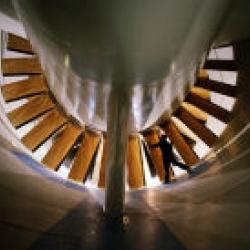Source Institutions
Source Institutions
Add to list Go to activity
Activity link broken? See if it's at the internet archive

In this activity, learners explore how wind tunnels provide feedback to engineers about the performance and durability of products such as planes, cars, and buildings. Learners work in teams to build their own model of a car, using simple materials, and test their designs in a classroom wind tunnel set up.
- 10 to 30 minutes
- 1 to 2 hours
- $10 - $20 per group of students
- Ages 11 - 18
- Activity, Experiment/Lab Activity, Lesson/Lesson Plan, Simulation
- English
Quick Guide
Materials List (per group of students)
- Student Worksheets
- Small portable fan
- Rectangular cardboard box with ends removed
- Tape to affix box to floor in fixed position
- Ruler
- Wood or plastic to set up ramp (on 15 degree slope)
- Tape
- String
- Plastic wrap
- Foil
- Popsicle sticks
- Toothpicks
- Paperclips
- Paper
- Pencils
- Cardboard
- One cardboard tube (from paper towel or toilet paper roll)
Subjects
-
Earth and Space Science
-
Astronomy
- Probes, Satellites and Spacecraft
-
Astronomy
-
Engineering and Technology
-
Engineering
- Aerospace Engineering
- Mechanical Engineering
- Transportation Engineering
-
Technology
- Transportation
- Manufacturing
-
Engineering
-
Physical Sciences
-
Motion and Forces
- Machines
- Momentum and Velocity
-
Motion and Forces
-
The Nature of Science
-
The Scientific Process
- Conducting Investigations
-
The Scientific Process
-
The Nature of Technology
-
Technology and Society
- Impacts of Technology
-
The Design Process
- Research and Development
- Invention and Innovation
- Problem Solving
- Troubleshooting and Maintenance
-
Technology and Society
Informal Categories
- Model Building
- Transportation
Audience
To use this activity, learners need to:
- see
- read
- touch
Learning styles supported:
- Involves teamwork and communication skills
- Involves hands-on or lab activities
Other
Components that are part of this resource:
Includes alignment to state and/or national standards:
This resource is part of:
Access Rights:
- Free access
By:
Rights:
- All rights reserved, IEEE,
